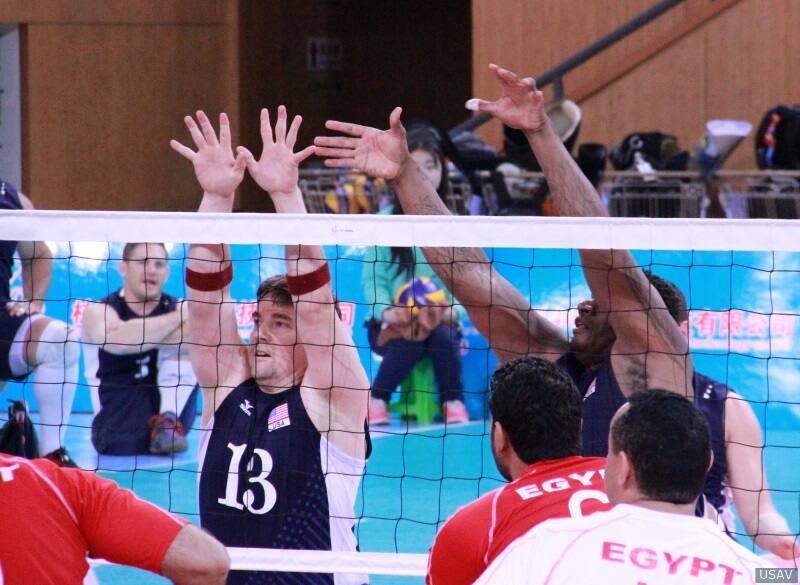
COLORADO SPRINGS, Colo. (April 1, 2016) – Charlie Swearingen doesn’t count the number of times he’s been asked – sometimes skeptically – how he can be a flight paramedic.
A member of the U.S. Men’s Sitting Volleyball Team, Swearingen has spent his life surpassing others’ expectations. The 6-foot-3 middle blocker was born with bilateral fibular hemimelia, a genetic disorder in which an individual is missing all or part of their fibula bone in the lower leg; he’s worn prosthetic legs ever since a double amputation at 9 months old.
Swearingen is the first to point out that in his line of work, shorter legs have benefited both him and the people he’s working to save.
“I move around the aircraft a lot easier, and I can get into smaller spaces. I’ve crawled into (dozens) of vehicles that were flipped over and been able to help other people that otherwise might have bled out,” he said. “The irony is a lot of times people are worried I won’t be able to do the job, and it’s a fair thought.
“But time and time again, it’s been an advantage, not a disadvantage.”
Growing up in Gulfport, Mississippi, Swearingen took to baseball rather than volleyball, playing varsity baseball for Millsaps College. However trying on a pair of running blades during a 2009 visit to his prosthetist set Swearingen on a collision course with USA Volleyball.
A video of Swearingen running a 5:42 mile in the legs went viral and Paralympic track coaches quickly called. During the 2009 Endeavor Games in Oklahoma, Swearingen was first exposed to sitting volleyball during a clinic, and the rest, he said, is history.
“I don’t remember if it was Bill (Hamiter, Sitting Program Director) or Elliot (Blake, Sitting Program Coordinator) who approached me, but they asked how long I’d been playing volleyball and told me about the Men’s Sitting team,” he added.
Leaving his dream job as a flight paramedic in Jackson, Mississippi to train with the Men’s Sitting Team wasn’t easy, but Swearingen said his years working on the helicopter prepared him well for the challenges of professional sport.
“The chemical response we feel and interpret as emotion… that chemical reaction is the same no matter if you’re at the service line, or in a car talking to an 8-year-old girl who is about to go,” he said. “I’ve been taught to rely on my training, so any time I feel like the situation is overwhelming, I sit back, take a breath and rely on all that training.”
Swearingen’s training served him well recently during the World ParaVolley Intercontinental Cup in China.
On Day Three of competition, Swearingen found himself at the service line down two sets and facing a 24-19 deficit against Iran, the No. 2-ranked team in the world. A calm approach by Swearingen and scrappy play from his teammates kept the Americans in the match, pushing the Iranians to 28-28. Iran eventually took the set 30-28, but the fight and determination revealed something new about a U.S. team that struggled with consistency throughout the tournament, Swearingen said.
“It’s a marriage between finesse and just true grit and excitement,” he said after the match. “It was fantastic to be a part of because we just came together as we leaned into the game and everything else just started to come together.”
Swearingen started all six matches during the Intercontinental Cup, scoring 15 points from 10 kills, three blocks and two aces.
“Charlie is a shining example of what we want in our athletes,” said Greg Walker, the U.S. Men’s Sitting Team head coach. “He’s one of the best in the world in his (professional) field… and he’s doing such a great job of what we’ve asked of him.”
Now back at work as a critical care clinical instructor with Air Methods, a Denver-based air medical service provider, Swearingen and his volleyball teammates are turning their focus toward September’s Paralympic Games in Rio de Janeiro. The U.S. Men’s Sitting Team is making its first appearance in more than a decade, and the team will be hungry to improve on its 0-6 performance at the Intercontinental Cup.
“We were talking about our play and there were obviously some good things and bad things,” Swearingen said after the tournament. “One theme we kept bringing back up is relaxing, finding a groove and if we can just focus on that for a little and remember that we’re all here for a reason, we have the tools to be successful.”
